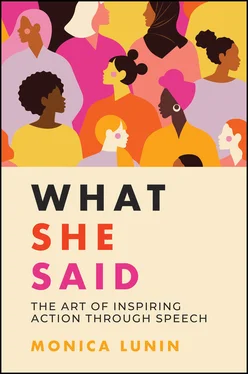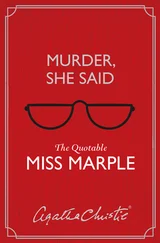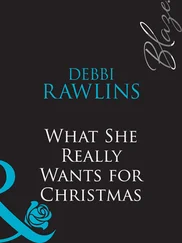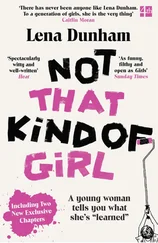Monica Lunin - What She Said
Здесь есть возможность читать онлайн «Monica Lunin - What She Said» — ознакомительный отрывок электронной книги совершенно бесплатно, а после прочтения отрывка купить полную версию. В некоторых случаях можно слушать аудио, скачать через торрент в формате fb2 и присутствует краткое содержание. Жанр: unrecognised, на английском языке. Описание произведения, (предисловие) а так же отзывы посетителей доступны на портале библиотеки ЛибКат.
- Название:What She Said
- Автор:
- Жанр:
- Год:неизвестен
- ISBN:нет данных
- Рейтинг книги:4 / 5. Голосов: 1
-
Избранное:Добавить в избранное
- Отзывы:
-
Ваша оценка:
- 80
- 1
- 2
- 3
- 4
- 5
What She Said: краткое содержание, описание и аннотация
Предлагаем к чтению аннотацию, описание, краткое содержание или предисловие (зависит от того, что написал сам автор книги «What She Said»). Если вы не нашли необходимую информацию о книге — напишите в комментариях, мы постараемся отыскать её.
What She Said
What She Said
What She Said — читать онлайн ознакомительный отрывок
Ниже представлен текст книги, разбитый по страницам. Система сохранения места последней прочитанной страницы, позволяет с удобством читать онлайн бесплатно книгу «What She Said», без необходимости каждый раз заново искать на чём Вы остановились. Поставьте закладку, и сможете в любой момент перейти на страницу, на которой закончили чтение.
Интервал:
Закладка:
fiery speeches that are delivered when you need to draw the line or demand respect, and those that instead use humour to pave the way to understanding.
The lessons provided from each of the speeches can be applied to your own practice of communication. Sometimes you will need to present in a way that encourages people to do something, to act in some way, or to change their behaviour. Plenty of trailblazers are included here for you to follow. At other times, of course, a softer touch is what you need, to open a closed mind — just a crack — so that you might sow the seeds of change, and examples of these speeches are also included here.
Among the women featured in this book, you will find a wide variation in style. Some are confident, some are shy. Some are fighters and some are thinkers. Some have built up their public-speaking skills over a lifetime and some are uncomfortable in the limelight. All are worthy of listening to and learning from.
We tend to think rational arguments are formed purely based on fact. However, eloquence — and guidance — can also be found in unexpected places. Many speeches through this book can help you learn how to animate your technical or logical presentations to make other people see things your way.
And along with the beauty in the speeches that serves to bring people closer together, lessons can be found here too. If you have ever faced the challenge of fostering inclusion, you will no doubt be moved by the speeches in this book that enhance existing bonds and create new connections among seemingly disparate groups. And finally you have the treat of looking to the words of some master storytellers to encourage you in the ongoing journey of developing your own voice.
But this book is more than a collection of inspiring and powerful speeches. I also provide some context as an introduction for each speech. And after the inclusion of each speech (either the whole speech or a substantial extract from it), I then break down three observations that make the speech so powerful. So you not only have ‘what she said' but also ‘how she did that’.
This book is intended as a celebration of diversity. Once you start to look you will find gems of oratory in every pocket of humanity. No limits based on ethnicity, background, education, race, age or even gender exist when it comes to the power of the spoken word. Once I set my intention these speeches were not hard to find. We have only to look a little further than the prevailing popular orations, no matter how good these might be. It is time to cast the net wider.
In the words of Margaret Atwood, ‘a word, after a word, after a word has power’. So let's learn how to harness and leverage the power we all have.
1 Providing guidance, advice and wisdom
Appreciating the nature of the relationship between speaker and audience is important in crafting and delivering a speech that bestows guidance, advice and wisdom.
This relationship is usually somewhat unequal. This is not to say that the speaker is in any way better but, in the context of the advice, they have the upper hand. Their expertise, achievement, seniority (or some other distinguishing factor) creates in the minds of the audience a desire to listen and to extract meaning.
Think about all the scenarios in which this might happen — a classroom where the teacher is naturally in charge, for example, a church where parishioners settle in for the insight of a sermon, or a graduation ceremony where a keynote speaker is scheduled to punctuate the formalities.
The same relationship might arise in a professional context. You might have a manager inducting a group of new recruits, for example, an outgoing executive sharing the lessons learned during their tenure, or an experienced professional speaking at an industry conference.
If you find yourself in any of these scenarios, you can assume a certain amount of receptivity in the crowd before you begin. Unlike a political speech, you probably won't need to worry about hecklers or even anyone directly challenging your opinion. For the most part, your audience will be ready and willing to listen to you. This is a warm room.
Of course, that doesn't mean this type of speech is easy. Mastering a few fundamentals will make sure you build on the credibility that has already been bestowed upon you.
You will need to rise to the occasion. A hierarchy exists here, no matter how slight, and you are the senior. You need to assume the role. Be yourself, but the confident, assured, professional and accomplished version of yourself. Avoid apologising, demurring or otherwise giving away your power. Stand your ground, feel secure in yourself, open strongly and the rest will follow.
When providing guidance, giving advice or sharing wisdom, you have a fair amount of latitude when it comes to content — so get creative. You might want to choose a structure like ‘my top ten tips' to give shape to your thoughts, share a personal story or even set the whole talk in the future. Organising your content into some sort of structure will help your audience stay with you as you work through your speech.
These types of speeches also allow for ‘big picture' thinking. Concepts that might sound esoteric or idealistic can find a perfect home in this talk. A great example is Michelle Obama's claiming of the moral high ground in her speech at the Democratic National Convention supporting Hillary Clinton's presidential campaign.
You can also draw from your own experiences in formulating content in these types of speeches, sharing stories and lessons learned. Put yourself in the message as much as possible. You are there to speak because of your personal experience or track record. People want to connect with you. So sharing a little bit of yourself can be helpful — as you can see with Nora Ephron's speech at Wellesley College. Avoid disembodied advice in favour of wisdom that you earned from your own wins and losses.
This might even be an opportunity for you to set the bar a little higher. Consider Florence Nightingale, reaching out to us from a very different time. She was clear about the principles she considered vital for a nurse to adopt and nurture for a successful career, and she created an aspirational target for young women. In your world, this approach could have the added benefit of serving as a yardstick for future conversations.
The wisdom you share might be closely linked to your own area of expertise. You might begin by considering why you have been asked to speak, and what it is about your unique set of experiences that means others will want to listen. In the case of Virginia Woolf speaking about ‘women in fiction’ at Cambridge University in 1928, the skills of the novelist are leveraged to create a beautifully enigmatic piece, ‘Shakespeare’s sister'.
Your success in delivering an impactful and inspirational speech of guidance, advice or wisdom will depend on your own self-belief and your commitment to connect with and truly help each person in your audience. Be generous of spirit, remember they want to hear what you have to say, and you will make a difference.
… I wake up every morning in a house that was built by slaves. And I watch my daughters, two beautiful, intelligent, Black young women, playing with their dogs on the White House lawn. And because of Hillary Clinton, my daughters, and all our sons and daughters, now take for granted that a woman can be president of the United States.
Michelle Obama
Michelle Obama
Former First Lady of the United States, author and speaker
B: 17 January 1964, Chicago, IL, United States
When they go low, we go high
When: 26 July 2016
Читать дальшеИнтервал:
Закладка:
Похожие книги на «What She Said»
Представляем Вашему вниманию похожие книги на «What She Said» списком для выбора. Мы отобрали схожую по названию и смыслу литературу в надежде предоставить читателям больше вариантов отыскать новые, интересные, ещё непрочитанные произведения.
Обсуждение, отзывы о книге «What She Said» и просто собственные мнения читателей. Оставьте ваши комментарии, напишите, что Вы думаете о произведении, его смысле или главных героях. Укажите что конкретно понравилось, а что нет, и почему Вы так считаете.












